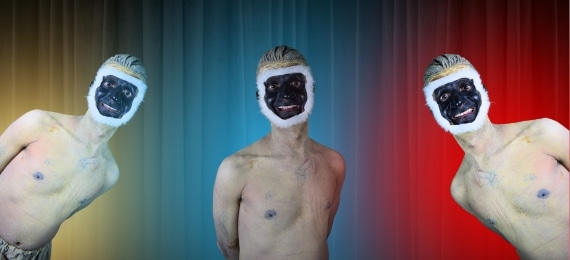
Bhavnagar, Gujarat was not a typical place to grow up for young boy Jacky Wadhvani. This is where the chaotic beauty of the slums could be found. But the story of Jacky was destined to be different. His love for langurs, the sacred animals in India, was so deep that he would find himself walking through paths of challenges, compassion, and an unwavering spirit.
Jacky was fascinated with langurs from his childhood. He spent hours watching their play in the trees, mesmerized by their behavior. This early childhood passion blossomed into a lifelong devotion that shaped his journey in extraordinary ways.
Becoming the Monkey Man
With time, Jacky realized he could convert his passion for langurs into an individual business. Painting his face and body, wearing a monkey suit, and mimicking the langurs, Jacky started performing at weddings and festivals. He started performing plays and acting to be merry and entertaining; the children loved him so much that he soon became the heartthrob of the town.
However, success came at a cost. Jacky’s orthodox Gujarati-Sindhi community disapproved of his unconventional choices. Disowned by his family and ostracized by his community, Jacky faced immense loneliness. At just 20 years old, he moved to Junagadh, where he took on odd jobs to survive. Amidst these struggles, he found solace and guidance from Guru Jee, a reclusive godman who encouraged him to pursue his dreams.
A Devotion Like No Other
Despite the hardships, Jacky never gave up on his love for langurs. Every week, he would travel 250 kilometers to feed over 100 langurs, preparing 500 to 1,000 chapatis for them. The langurs recognized his devotion and waited patiently for their turn to receive food. This extraordinary bond became the heart of Jacky’s life, giving him a sense of purpose and fulfillment.
Jacky’s primary source of income remained performances, for which he earned $10–12 in a day and about $200 during the festival time. He worked very hard to master his art to which he was accustomed at being teased and ridiculed as a badge of pride. However, beneath those jests and laughter stood Jacky, living within the slums and finding it difficult to miss out on his family, particularly the mother. Their occasional phone calls often ended in shared tears, a poignant reminder of the love and acceptance he yearned for.
A Dream of Acceptance
Jacky’s ultimate dream is simple yet profound: to be recognized and accepted for who he is. He hopes that his success as the “Monkey Man” will one day bridge the gap between him and his estranged family and community. His journey, though fraught with challenges, is a testament to his resilience and the power of love and compassion.
Capturing the Essence of Humanity
Langur is so beautifully the film of Jacky’s story. It is an epic saga regarding his commitment to langur, the battle against convention, and the influence left by Guru Jee guidance. The film is very heartwarming, both as a tribute to the spirit of Jacky, and the unique bond which he shares with the langurs.
The transformation power of compassion through Langur in Jacky’s journey has given insight to taking care of street animals. This is a reminder that love can be that spark in the dark and gives us meaning and purpose despite the adversity.
A tale of hope and inspiration
Jacky Wadhvani’s story is more than a narrative about a man and his love for langurs. It’s a celebration of the human spirit—a story of resilience, compassion, and the pursuit of dreams. Langur invites us to reflect on our connections with the world around us and inspires us to embrace those who dare to be different.
It was in his words that teasing him off as a monkey wasn’t insulting, but rather, he found it as a compliment. He has, along his journey, proven that being the truest of themselves and embracing all these peculiarities can bring much love, purpose, and meaning into one’s life.
